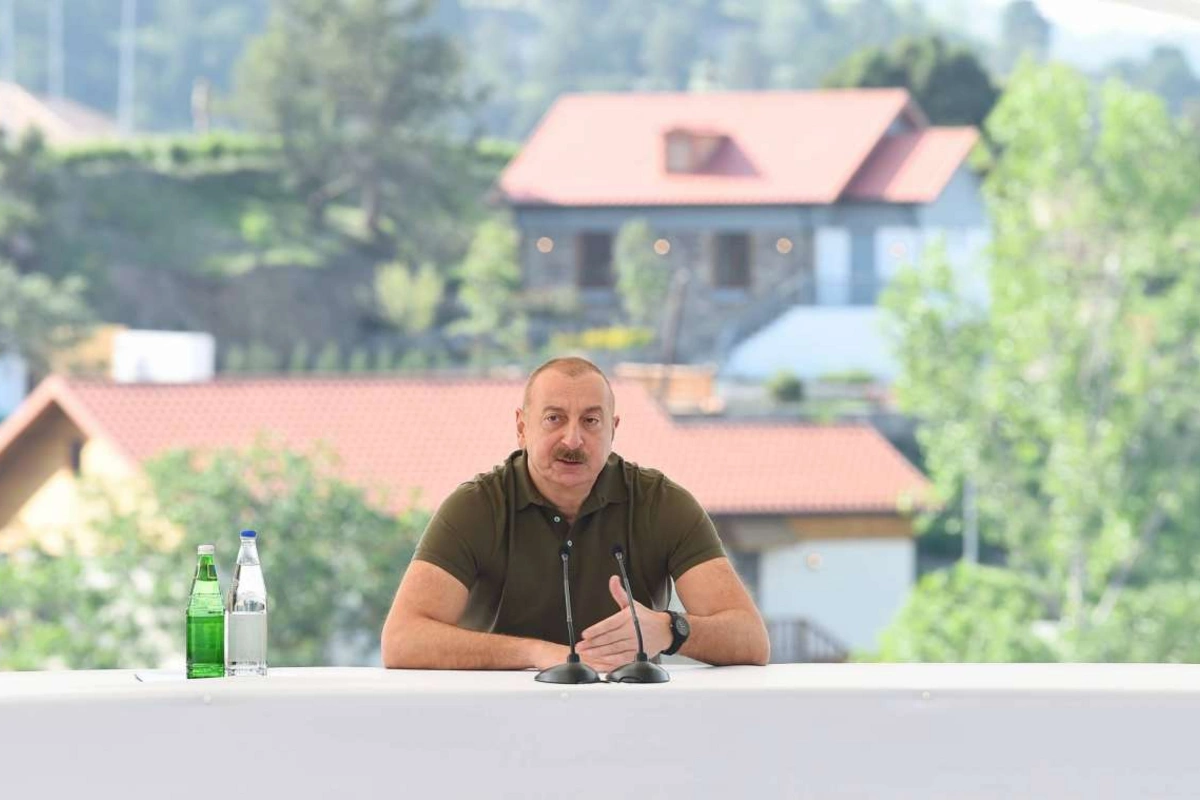
With a full peace treaty between Azerbaijan and Armenia in sight, one thing is still unclear: what will happen to the individuals who led the separatist movement in Karabakh? Azerbaijan's president has an idea.
Image: president.az
During his address in Lachin on 28 May, Azerbaijani President Ilham Aliyev reiterated that Karabakh’s Armenian population must “obey the laws of Azerbaijan [and] be a loyal and normal citizen of Azerbaijan.” Aliyev further stated that he was willing to offer amnesty to any Armenian authorities in Karabakh should they leave their positions and apply for Azerbaijani citizenship. He is quoted as saying, “All so-called ‘ministers,’ ‘deputies,’ and others should give up their positions. Only in that case can a concession be made to them. Only in that case can we talk of an amnesty.”
Following this, the self-proclaimed authorities in Karabakh denounced Aliyev’s statements, calling on the president to engage in a dialogue “based on the norms and principles of international law, especially on the principles of equality and self-determination of people, non-use of force and threat of force, peaceful settlement of disputes and principles of territorial integrity.” However, Azerbaijan states that although one meeting was held between Baku and the self-proclaimed authorities on 1 March, Azerbaijan’s second attempt to open dialogue was refused.
Moreover, the Armenian Ministry of Foreign Affairs accused Aliyev’s speech of being “warmongering” and “genocidal.” These comments were rebuffed by Azerbaijan, with the Ministry of Foreign Affairs issuing a statement: “We resolutely reject the biased and baseless statement […] with reference to views and calls expressed by President of the Republic of Azerbaijan Ilham Aliyev in Lachin district on 28 May 2023.” Additionally, despite the Armenian rhetoric, Matthew Miller, the U.S. Department of State Spokesperson, issued a press release stating “we welcome President Aliyev’s recent remarks on consideration of amnesty.”
Rather than “warmongering,” Aliyev’s speech appears to appeal to the self-proclaimed authorities to accept amnesty—a tactic that has been attempted by several countries to resolve territorial disputes over the past few decades. For example, in 2021, Spain pardoned a number of Catalan separatists who were jailed following a failed bid for independence in 2017, a move which the government hoped would calm tensions with the Catalan region. Spanish Prime Minister Pedro Sanchez stated, “With this act, we want to open a new era of dialogue and reconciliation, and end once and for all the division and confrontation.” This appears to have been partially successful, with in-fighting now occurring within the Catalan separatists on how to proceed—either by dialogue with Madrid or unilateral action.
However, not all calls for amnesty have been successful. In 2009, the Sri Lankan government issued a statement offering amnesty for all LTTE (Liberation Tigers of Tamil Eelam) rebels who surrendered and in 2021, the government pardoned 8 LTTE prisoners. Yet, there is concern in the international community regarding recent instances of torture and enforced disappearances. Moreover, in 2021, the UK government suggested offering amnesty to IRA (Irish Republican Army) fugitives wanted in connection with crimes committed during the Troubles before the Good Friday Agreement in 1998. However, this plan was successfully blocked by public disapproval, with the government instead suggesting offering immunity to those who provide information to a new fact-finding panel. Despite this, the public is still opposed to these plans, with opponents, including surviving victims and the family members of those killed in IRA bombings, sending letters to every MP in the country stating how many people were killed within each constituency. Furthermore, French President Emmanuel Macron has repeatedly rejected Corsica’s call for amnesty for separatists, but has stated that he is prepared to mention Corsica in the French Constitution. This shows that while the country may be prepared to offer Corsica some autonomy and provisions (although not all-out independence), the violence perpetrated during the island’s struggle with France cannot be so easily forgiven.
It is important to note that during his speech in Lachin, Aliyev further stated that “there are no obstacles left to the peace treaty” as Armenia has recognized Azerbaijan’s territorial integrity and that “even if a peace treaty is not signed, we will live in peace in security.” This point was reiterated by Miller, who stated “As Secretary Blinken said, peace is achievable in the South Caucasus.”
Share on social media